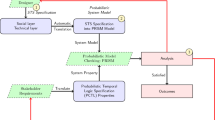Abstract
We seek to construct autonomous adaptive survivable systems that use active trust management to adapt their own behavior in the face of compromises in the computational environment. Active trust management maintains probabilistic trust models that indicate the trustworthiness of different resources for different tasks, and uses these models in rationally adapting allocations of computational resources to tasks. Flexible adaptation of allocations to changing circumstances places great demands on the methods used to represent the utility information needed by rational decision-making mechanisms. This paper explains how to use qualitative preference specifications to exercise effective control over quantitative trust-based resource allocation by facilitating convenient specification and adaptation of the stable foundations of the trust manager’s utility judgments.
Access this chapter
Tax calculation will be finalised at checkout
Purchases are for personal use only
Preview
Unable to display preview. Download preview PDF.
Similar content being viewed by others
References
Shrobe, H., Doyle, J.: Active trust management for autonomous adaptive survivable systems. In Robertson, P., Shrobe, H., Laddaga, R., eds.: Self-Adaptive Software. Lecture Notes in Computer Science. Springer Verlag, Berlin (2001) 40–49 Revised papers from the First International Workshop on Self-Adaptive Software (IWSAS 2000).
Doyle, J., Kohane, I., Long, W., Shrobe, H., Szolovits, P.: Agile monitoring for cyber defense. In: Proceedings of the Second DARPA Information Security Conference and Exhibition (DISCEX-II), IEEE, IEEE Computer Society (2001)
Haimowitz, I.J., Kohane, I.S.: Automated trend detection with alternate temporal hypotheses. In: Proceedings of the Thirteenth International Joint Conference on Artificial Intelligence, Chambery, France (1993) 146–151
Doyle, J., Kohane, I., Long, W., Shrobe, H., Szolovits, P.: Event recognition beyond signature and anomaly. In: Proceedings of the 2001 IEEE SMC Workshop on Information Assurance and Security, United States Military Academy, West Point, New York. (2001) 17–23
Haddawy, P., Hanks, S.: Utility models for goal-directed decision-theoretic planners. Computational Intelligence 14 (1998) 392–429
Savage, L.J.: The Foundations of Statistics. second edn. Dover Publications, New York (1972)
Wellman, M.P., Doyle, J.: Preferential semantics for goals. In: National Conference on Artificial Intelligence. (1991) 698–703
Doyle, J., Shoham, Y., Wellman, M.P.: A logic of relative desire (preliminary report). In Ras, Z.W., Zemankova, M., eds.: Methodologies for Intelligent Systems, 6. Volume 542 of Lecture Notes in Artificial Intelligence., Berlin, Springer-Verlag (1991) 16–31
Doyle, J., Wellman, M.P.: Representing preferences as ceteris paribus comparatives. In Hanks, S., Russell, S., Wellman, M.P., eds.: Proceedings of the AAAI Spring Symposium on Decision-Theoretic Planning. (1994)
Tan, S.W., Pearl, J.: Specification and evaluation of preferences for planning under uncertainty. In Doyle, J., Sandewall, E., Torasso, P., eds.: KR94, San Francisco, CA, Morgan Kaufmann (1994)
Tan, S.W., Pearl, J.: Qualitative decision theory. In: AAAI94, Menlo Park, CA, AAAI Press (1994)
Boutilier, C.: Toward a logic for qualitative decision theory. In Doyle, J., Sandewall, E., Torasso, P., eds.: Principles of Knowledge Representation and Reasoning: Proceedings of the Fourth International Conference (KR’94), San Francisco, Morgan Kaufmann (1994)
Boutilier, C., Brafman, R.I., Hoos, H.H., Poole, D.: Reasoning with conditional ceteris paribus preference statements. In: Proceedings of Uncertainty in Artificial Intelligence 1999 (UAI-99). (1999)
Bacchus, F., Grove, A.: Graphical models for preference and utility. In: Proceedings of the Eleventh Conference on Uncertainty in Artificial Intelligence, Morgan Kaufmann (1995) 3–19
Bacchus, F., Grove, A.: Utility independence in a qualitative decision theory. In: Proceedings of the Fifth International Conference on Knowledge Representation and Reasoning, Morgan Kaufmann (1996) 542–552
Shoham, Y.: Conditional utility, utility independence, and utility networks. In Geiger, D., Shenoy, P.P., eds.: Proceedings of the Thirteenth Conference on Uncertainty in Artificial Intelligence, San Francisco, California, Morgan Kaufmann (1997) 429–436
Shoham, Y.: A symmetric view of probabilities and utilities. In Pollack, M.E., ed.: Proceedings of IJCAI-97, San Francisco, California, Morgan Kaufmann (1997) 1324–1329
Wellman, M.P., Doyle, J.: Modular utility representation for decision-theoretic planning. In: Proceedings of the First International Conference on AI Planning Systems. (1992)
Doyle, J., Thomason, R.H.: Background to qualitative decision theory. AI Magazine 20 (1999) 55–68
McGeachie, M.: Utility functions for ceteris paribus preferences. Master’s thesis, Massachusetts Institute of Technology, Cambridge, Massachusetts (2002) In preparation.
Author information
Authors and Affiliations
Editor information
Editors and Affiliations
Rights and permissions
Copyright information
© 2003 Springer-Verlag Berlin Heidelberg
About this paper
Cite this paper
Doyle, J., McGeachie, M. (2003). Exercising Qualitative Control in Autonomous Adaptive Survivable Systems. In: Laddaga, R., Shrobe, H., Robertson, P. (eds) Self-Adaptive Software: Applications. IWSAS 2001. Lecture Notes in Computer Science, vol 2614. Springer, Berlin, Heidelberg. https://doi.org/10.1007/3-540-36554-0_12
Download citation
DOI: https://doi.org/10.1007/3-540-36554-0_12
Published:
Publisher Name: Springer, Berlin, Heidelberg
Print ISBN: 978-3-540-00731-9
Online ISBN: 978-3-540-36554-9
eBook Packages: Springer Book Archive




